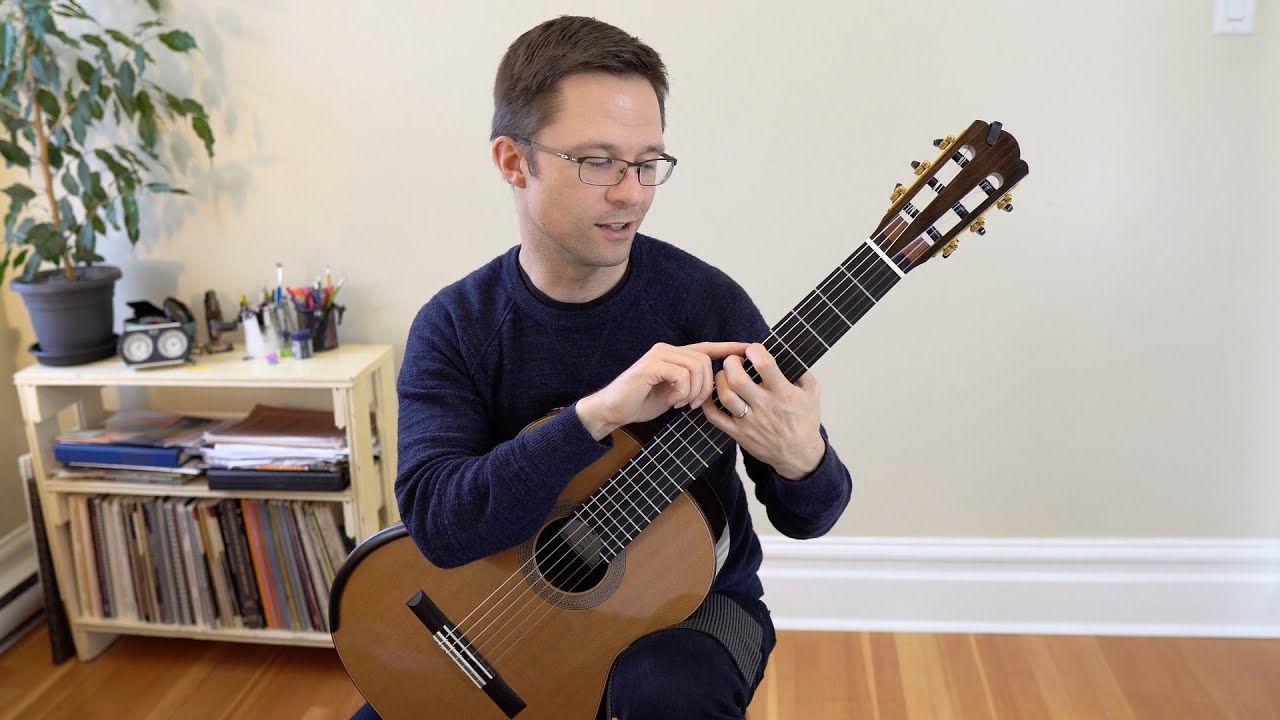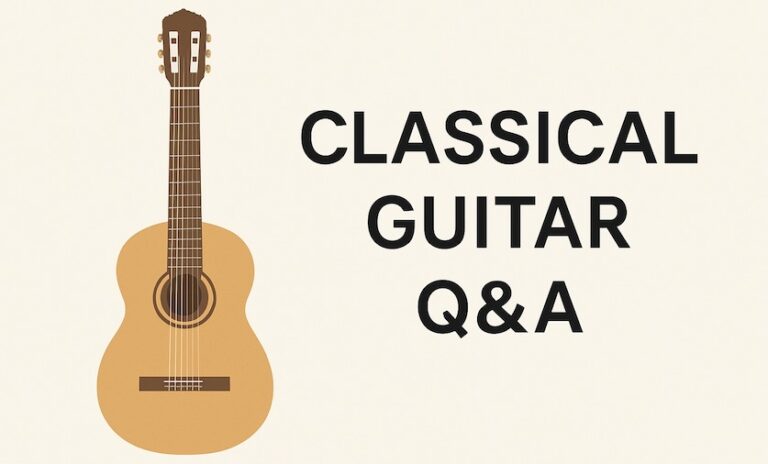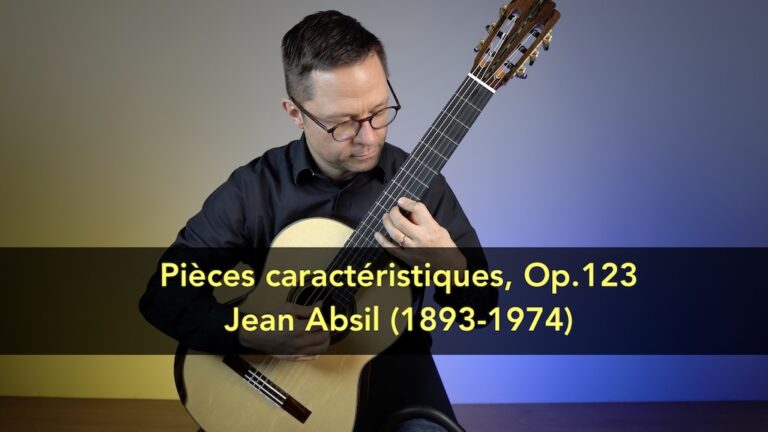
Learn classical guitar with my curriculum and educational series
Learn classical guitar online with our classical guitar academy and structured curriculum. Each section below lists the recommended materials that will guide you through my educational books and videos. Complete each section before moving to the next. Coming soon to our academy and curriculum is a music theory section and personalized feedback for members. Other important resources on my site:
- Lesson Page – Browse specific lessons and topics.
- Free membership newsletter – Join to see my weekly lessons and watch pro videos.
- Sheet music page – Find supplemental material to my books.
Important factors to consider with “grades”
There are no grades in music, pros play music from all the grades. I highly recommend you play lots of music from lower grades. For example, I have my grade 4 students play a lot of grade 2 pieces to work on musicality. Students who perform well might have worked on that piece for a whole year or more, played in lessons, masterclass, for friends, family, and smaller concerts. They’ve had success and failure and worked through it. All your ambition and goals should be related to playing music well rather than progressing to the next grade. Find good music that just happens to be playable for you. See my video: Six Misconceptions About Grade Levels in Music Studies
Practicing Well
How to Practice Music and Organize Your Practice Session – Read this article to make sure you have a solid practice session plan. Without a good practice routine you might hinder your longterm progress.
Does Practicing for Hours and Hours Make you Better at Guitar? – In this lesson I explore how the quality of your practice is far more important than the amount of time you practice.
Curriculum for Classical Guitar
Absolute Beginner Level
- Required Book
- Classical Guitar Method Volume 1 (Free PDF)
- Supplemental Repertoire (After Completing Volume 1)
- Late-Beginner Collection – 18 Works, Free
- Beginner pieces from my graded sheet music page.
- Required Technique
- Use the material at the back of method book 1
Proceed through my method book and video lessons while simultaneously using the technique section at the back of the book as a technique routine. The exercises might seem simple but they are the foundation of your playing so keep practicing them with more and more refinement. Review the sitting and hand positions often as they will need constant reevaluation.
Everything you need is in the book and all the videos are listed on the sales page (just scroll down to the video lesson list). It’s all free and should get you started with reading and playing melodies and arpeggios. It’s not necessary to know everything when you are starting out, you want to get playing and reading and experiencing music before diving in deeper.
Start with only 15-20 minutes a day of enjoyable practice. You can practice shorter or longer as needed. Whatever amount of time keeps it enjoyable. As you gain confidence and your mind and body adjust to the experience, you can increase the amount of practice time. Only practice as long as you can concentrate at a high level. As your brain gets comfortable with reading and studying music it will be able to concentrate longer and longer but it does takes time. Always end your session with something enjoyable and easy, even if it’s just open strings!
Late-Beginner Level
- Required Book
- Classical Guitar Method Volume 2
- Supplemental Repertoire
- Late-Beginner Collection – 18 Works, Free
- Beginner pieces from my graded sheet music page.
- Required Technique
- Use the material at the back of method book 2
Proceed through the book while simultaneously using the technique section at the back of the book for a technique routine. Everything you need is in the book and videos help you with each section. This book teaches you to read and play music in various tonal keys. The Late-Beginner Collection will have additional pieces to study and challenge you.
“Late-beginner” is not the best term to describe this level. This level is in many ways fully fledged classical guitar playing. Maybe a better term would be “late-foundational” as this is the foundation of your guitar playing.
Early-Intermediate (Grade 1)
- Required Books
- Classical Guitar Repertoire Lessons Grade 1 – Complete this first.
- Repertoire Supplement Grade 1 – Ten additional pieces to play.
- Required Technique
- Classical Guitar Technique – Work on this simultaneously with the above grade 1 books. There are technique routines at the start of the book (use the late-beginner routine). You’ll continue with this routine into grade 2 so no big rush to complete it. There are many exercises in the routine but just try to play something from each section. Slowly check off the exercises you can play and focus on the ones you find difficult and make them your strengths.
- More Repertoire (Optional)
- Easy Classical Guitar, Volume 1
- Easy Classical Guitar Volume 2.
- Grade 1 pieces from my graded sheet music page.
Study my Repertoire Lessons Grade 1 book and start working on a routine from my Technique book. After you complete the lesson book you can play the 10 additional works from my supplement. The technique book has multiple technique routines at various levels to limit the material to a manageable amount.
You might think that grade 1 implies easy playing but actually this level requires significant amounts of coordination. This is essentially the movements and textures needed to play all classical guitar repertoire so don’t think you haven’t come a long way! You’ve made it.
Early-Intermediate (Grade 2)
- Required Books
- Classical Guitar Repertoire Lessons Grade 2
- Required Technique
- Classical Guitar Technique – Work on this simultaneously with the above. There are technique routines at the start of the book (use the late-beginner routine). Continue with the routine as you did in grade 1 but try to add a new level of refinement. More legato, more relaxed, faster speeds, better projection. Take your time with anything you find difficult.
- Supplemental Repertoire (Recommended)
- Easy Classical Guitar, Volume 1
- Easy Classical Guitar Volume 2.
- Grade 2 pieces from my graded sheet music page.
As you progress through the grades continue with more difficult technique routines from my technique book. Continue to supplement the experience with repertoire at the appropriate grade level or use my Easy Classical Guitar Vol.1 or 2 collection which contains repertoire between grade 1-3.
Grade 2 is not much different than grade 1. The textures and fingerings are just a tiny bit more complex. No new significant skills are learned other than increased musical ability and technique.
Early-Intermediate (Grade 3)
- Required Books
- Classical Guitar Repertoire Lessons Grade 3
- Required Technique
- Classical Guitar Technique – Work on this simultaneously with the above. Use the early-intermediate routine. Although it says 20 minutes, you can ease into this by only starting with 10-15 minutes of technique. You don’t have to play every exercise everyday. Stay focused on the core categories of Scales, Arpeggios, Slurs, Barre, and Stretch/Independence and just try to get a few exercises from each one. Check them off as your feel confident and focus on the exercises that need more work.
- Supplemental Repertoire (Recommended)
- Easy Classical Guitar, Volume 1
- Easy Classical Guitar Volume 2
- Grade 3 pieces from my graded sheet music page.
As you progress through the grades continue with more difficult technique routines from my technique book. Continue to supplement the experience with repertoire at the appropriate grade level or use my Easy Classical Guitar Vol.1 or 2 collection which contains repertoire between grade 1-3.
Grade 3 should be studied for a long time. Try to complete all the supplemental material if possible. Grade 4 will be a significant increase and challenge so enjoy yourself for now and lay a strong foundation before moving on.
A helpful video for conceptualize technique practice, 7 Technique Categories to Practice Every Day on Classical Guitar.
Intermediate (Grade 4-6)
- Required Books
- Classical Guitar Repertoire Lessons Grade 4
- Classical Guitar Repertoire Lessons Grade 5
- Classical Guitar Repertoire Lessons Grade 6
- Exploring the Fretboard: 100 Exercises for Intermediate Guitar
- Required Technique
- Classical Guitar Technique – Work on this simultaneously with the above. Use the intermediate routine. At this grade level technique practice becomes a more important aspect of practicing. You’ll want to dedicate a good portion of your session to technique as it will be like practicing all your repertoire at once.
- Supplemental Repertoire
- Carcassi Etudes Op.60, No.1-25, Grade 5-9, Recommended
- Le Papillon, No. 1-32, Op.50 by Giuliani, Grades 1-7
- 25 Studies, Op.60 by Fernando Sor, Grades 1-7
- Grade 4-6 pieces from my graded sheet music page.
Practice the graded books one at a time while adding appropriate technique exercises. When you complete a book it is wise to play quite a bit more repertoire at the same grade level before moving on. Make sure you are confident with the repertoire before moving on to the next grade. This can takes, weeks, months, or years. Take your time and focus on quality. Professional guitarists play music from all the grades but they play it in a very high quality and musically manner. I’d rather a student plays well at grade four forever than play poorly in a higher grade. There is so much beautiful music to play so enjoy it.
Grade 4 represents a significant increase in level as well as introduces a variety of new techniques that establish you firmly in the intermediate realm. Expect grade 4 to take a long time to settle into but luckily grade 5 and 6 are very similar, only more complex in nature.
A helpful video for conceptualize technique practice, 7 Technique Categories to Practice Every Day on Classical Guitar.
Late-Intermediate to Early-Advanced
After grade 6 it will be time to dive into some etudes and fretboard knowledge books. Another great thing to do is to cover an entire opus of etudes to test and refine your skills in a variety of musical textures. This is important as every student who has made this much progress usually needs a significant amount of time to even out their skills before moving forward. I highly recommend using the entire Carcassi Op.60 etudes for this task. I consider them essential for bridging the gap from intermediate to higher levels. For modern repertoire, a classic is Leo Brouwer Etudes which can also be great performance works. The 25 Studies, Op.60 by Fernando Sor and Le Papillon, No. 1-32, Op.50 by Mauro Giuliani, works might give you a good review and encourage you to focus on polishing your performance and refinement skills as well as sight reading.
Recommended for Grade 7
- Required Technique
- Classical Guitar Technique (late-intermediate routine)
- Required Fretboard
- Complete my Exploring the Fretboard
- Required Etude Collection
- Carcassi Etudes Op.60, No.1-25, Grade 5-9 – I recommend you play every etude, even the grade 5 and 6 ones, to test and solidify your skills. This is a long-term project to span multiple grades and years but can be integrated into an etude section of your practicing.
- Repertoire
- Grade 7 pieces from my graded sheet music page.
Recommended Books by Others
- Scale Pattern Studies by Aaron Shearer – Very comprehensive scale and melodic sight reading. I use this book with all my later level students to make sure they can read tonal music across the entire fretboard. I consider this book an essential part of reading and understanding the guitar.
- Leo Brouwer Etudes – These are excellent modern studies for students. They start easy but get quite advanced.
- Villa-Lobos Collected Solos – The etudes are an essential part of the repertoire but are quite advanced so beware.
- Les 100 de Roland Dyens Vol.1 and. Les 100 de Roland Dyens Vol.2 by Roland Dyens. These are fun works at the grade 6-9 level incorporating a variety of styles from modern composition to jazz influence.
- Music Theory Books – Learning and recommended books.
After Grade 8
Providing that your technique is somewhat in order, play everything. Get every book you can find. Find every explanation from pros you can hear or read. There are also plenty of technique books for advanced players, even my technique book can be used to the grade 10 level or beyond.
Classical Guitar Technique – Use the early-advanced routine. This is the usually when I start recommending students reach the recommended speeds I list on page 6. Many students get bumped back to intermediate technique at this point in order to work on speed and relaxation. I’ve rarely encountered a students who doesn’t need revamping at this point unless they have meticulously worked with a teacher but even then it is still rare. So enjoy discovering new musicality levels to your technique even at lower levels.
More exercises for everything – The Bible of Classical Guitar Technique by Käppel – 245 pages of exercises and excellent text advice. This book is large and can be tricky to organize a routine from but by the time you reach this level you’ll need advanced exercises to tackle your weaknesses and this book provides a wealth and variety of exercises for every technique. If you feel you’ve exhausted my technique book and are in need for more this is a great book.
For the advanced – The only method book for technique that I’ve seen for high levels is Kitharologus: The Path to Virtuosity by Ricardo Iznaola. It’s difficult but good. That said, I don’t recommend strict adherence to his metronome markings especially in regards to his rest-strokes during arpeggios. It starts from the beginning with just open strings but progresses very quickly. I recommend starting from the very beginning and using his advice and metronome markings at first only. Don’t skip any pages or you’ll pay for it later. He recommends you stay with an exercise for a least a week or two after reaching the tempo. I find his rest stroke approach, especially during arpeggios, quite intense and not for everyone. I follow the arpeggio rest strokes in the lower levels but only at slower speeds saving his general tempos for free stroke. I don’t always assign this book to students so beware of injury. I’d recommend having quite a bit of experience before approaching this book. In particular, be cautious with this book if you still have tension and relaxation issues as the technique requirement is so high.





The amount of information provided is impressive. I’m having trouble finding clear place to start. As a beginner with a lot of basic entry level knowledge. Lost on how to start and what it cost.
Start with my free beginner method book!
https://www.thisisclassicalguitar.com/free-classical-guitar-method-book-pdf/
If it goes quickly, great! You can then move to Volume 2.
I made a copy of this curriculum and have it with the beginning of Bradford Werner repertoire books. Using this to help me stay in the correct order. I did download repertoire supplement grade 1 and inserted it in the correct location in my binder. I finished repertoire 1 but not added supplement grade 1. I will finish this and then go back to grade 3. I enjoy and learn alot from your videos and your method books on classical guitar. Bradford Werner has the best system for learning classical guitar.
Hello Bradford
Your teaching method is excellent
I’m complete beginner and would like to learn classical guitar using your method but, there is a lot of content on your website, I don’t know where to start…
Could you please tell me exactly which section to start with and guide me step by step??
Hi, so follow the advice under “Absolute beginner” heading above. The required book is my Classical Guitar Method Volume 1 (Free PDF). After Completing Volume 1 then you proceed to the “Late-Beginner” section.
Thank you Bradford for your encouragement to play guitar well rather than being focused on
i am from India, in order to start a classical guitar school, I need your advise and notes of lessons.
sam, India,
Hi Sam, the best place to start is with my free pdf Method Book Volume 1: https://www.thisisclassicalguitar.com/free-classical-guitar-method-book-pdf/
Unbelievable free material thank you so much
would like to make a donation as it is worth a fortune!
What is best way of doing that?
Richard
Thanks so much Richard. I have a support page here: https://www.thisisclassicalguitar.com/donate-support/